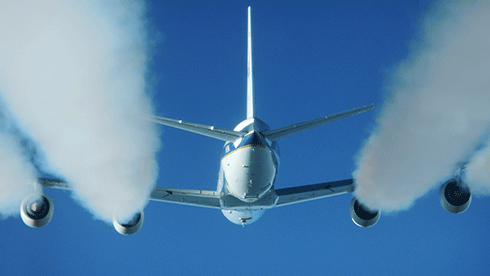
|
Published: 26 May 2014
Mallee biofuel could cut aircraft emissions, create new regional industry
Aircraft powered by biofuel made from Australian mallee trees could provide a boost to potential new regional industries, according to a recent report published by the Future Farm Industries Cooperative Centre (CRC).
Its authors say the mallee jet fuel sustainability and life-cycle assessment report – produced with funding from Airbus and support from industry partners Virgin Australia, Renewable Oil Corporation, Dynamotive and IFPEN – provides enough evidence to support continued research and development on mallee production and bio-oil upgrading, and to inform the business case for commercial production starting in Western Australia.
The report was launched recently in Perth by the CRC, along with representatives from Airbus (New Energies Programme Manager Frédéric Eychenne) and Virgin Australia (Regional Airlines Group Executive Merren McArthur).
CRC Research Director Dr John McGrath said the mallee jet fuel project looked at the Great Southern region of WA as a case study, examining the potential of a complete industry supply chain from grower to aviation user.
‘We already know that mallee growing integrates well with farm crop and livestock operations and can benefit natural resources in a number of ways, such as protecting and enhancing biodiversity, and contributing to rebalancing water tables.
‘What this report demonstrates is that mallees can provide a future economic benefit to farmers and regional communities, with a viable industry possible by 2021.
‘The scenario tested was based on what we know from existing plantings, and indicates that mallees could occupy up to six per cent of paddocks, or about one per cent of the Great Southern region.’
The report claims that a proposed mallee-based biofuels industry – including harvesting, transport and production – could provide employment for 40 people and bring about $30 million per year with the first regional plant.
The report’s life-cycle carbon emissions analysis estimates that jet flights leaving Perth Airport powered by 100 per cent mallee jet fuel sourced from Great Southern region farms could emit 40 per cent fewer greenhouse gases compared to those using petroleum-based jet fuel.
Great Southern farmers growing mallees on marginal cropping soils would benefit from higher profits and more uniform income, offsetting variable crop income.
The report also claims that mallee grown for jet fuel would require a comparatively small amount of land. As a ‘second-generation’ biofuel coming from a woody source and not food crop, it does not compete directly with food supplies.
‘The results show mallee jet fuel is a more sustainable option than our current fossil-based fuel supply while also providing valuable insights into potential new supply chain developers,’ said Virgin Australia Regional Airlines Group Executive, Merren McArthur.
Future Farm Industries CRC will cease operation on 30 June this year, bringing to a close seven years of research into profitable perennial plant farming systems for Australian broadacre agriculture. The CRC’s research projects have either been completed or transferred to other state agencies or funding bodies.
Source: Future Farm Industries CRC




